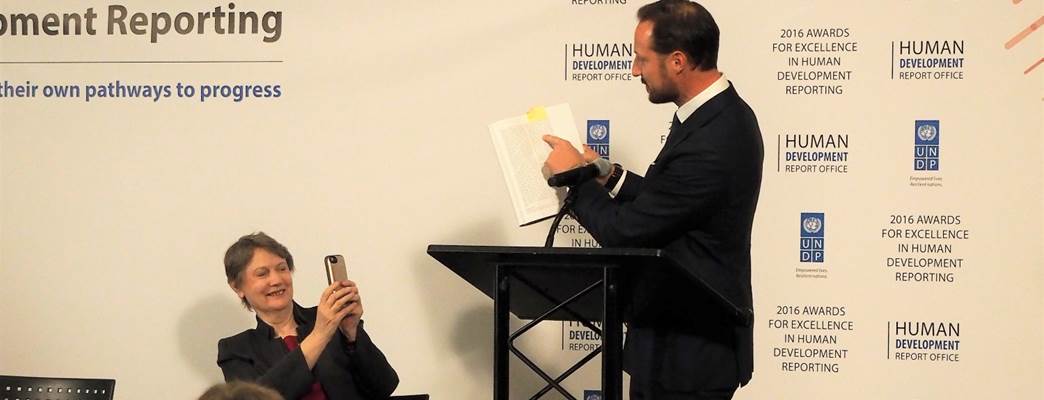Thank you for joining me here today to celebrate excellence in human development reporting.
How do we measure the unmeasurable? How do we give life and face to numbers and statistics? How can we draw a vivid picture which adds color and shape to the mere reporting?
These are challenges the contributors to the Human Development Reports are constantly facing. I have played a part in this writing process myself once, a really small part. But I have proof - as name 423 on that page...
It is hard making these reports. And that is part of the reason why the reports are so important. They are the substance behind the cold numbers, the real life behind the statistics. They serve as guidelines for policymaking and point out the steps we need to take next.
I am very proud to be a UNDP Goodwill Ambassador. This role has given me opportunities to understand how UNDP develops solutions to development challenges by engaging communities and people on the ground. This engagement is at the core of the human development approach, which should be integral to all development work.
Human Development Reports place an emphasis on understanding people's lives and their aspirations. And they recognize that development is complex, interlinked and multi-faceted. These two tenets have, together, been instrumental in explaining why human development thinking has improved understanding, and policy making, in many countries.
The more than 800 national and regional human development reports over the past 25 years have made significant contributions to the work of UNDP and to development more generally. I am very pleased to again present awards for excellence in reporting. The UNDP can be proud of this work.
Development can be challenging. We are all aware of policy initiatives that have not worked as intended. Sometimes this is because stakeholders were not engaged. National human development reports offer an opportunity for UNDP to engage with citizens, with academia, with government and with other development partners in diverse ways. This engagement in turn builds relationships between people and between organizations. And this can build trust and break down the silos that hamper holistic policy making.
I look forward to hearing about the innovative communication and outreach strategies that teams have pursued to try to ensure that the report is used and discussed by the community. Their analysis and recommendations are of interest to broad audiences and deserve to be read widely. In this Internet age we cannot simply release a report and hope that people will find their own way to the UNDP website. From what I have seen of these winning reports it seems that UNDP's human development reports are maintaining their proud tradition of innovation and breaking the mould in how they communicate their findings to the public. Congratulations!
The topics of these reports, which the Administrator has already described, are fascinating. Who isn't interested in a subject like happiness and its linkages to development, which the Chilean report team introduced?
Who could be against giving young people more of a voice in decision-making as the Sri Lankan report team did? As a member of the board of Young Global Leaders initiative that is an area I see as crucially important.
My congratulations to the award winning teams. I look forward to hearing more about your experiences of harnessing the views of stakeholders to craft recommendations that embody true human development.
Thank you very much.
